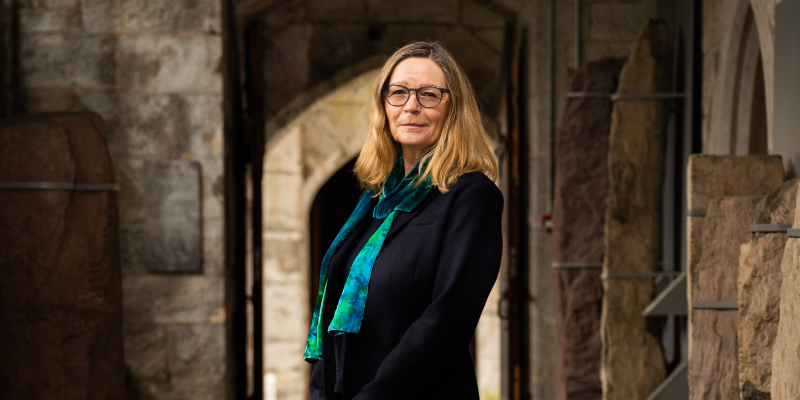In This Section
Challenging and changing sexual and social inequalities: Professor Maggie O’Neill

- Q&A with Professor Maggie O'Neill, Professor of Sociology & Criminology and Director of UCC Futures – Collective Social Futures, and ISS21.
- Social justice is at the core of her work, with a long history working in interdisciplinary ways across sociology, biographical sociology and arts practice to create change.
Professor Maggie O’Neill is Professor of Sociology and Criminology at University College Cork, and Director of UCC Futures – Collective Social Futures, and ISS21 Institute for Social Science in the 21st Century. She is a member of The Royal Irish Academy, elected in recognition of her outstanding academic achievements.
In 2023, Professor O’Neill was awarded a prestigious IRC Advanced Laureate Award for her research project EuroBorderWalks - Walking Borders, Risk and Belonging: advances in ethno-mimetic research in the making and re-making of three European borders.
The ground-breaking project aims to open up horizons and opportunities for scholarship and produce knowledge and understanding that has impact, that makes a difference, not only in better understanding the problems and challenges associated with the three borders (Croatia/Bosnia-Herzegovina, Poland/Ukraine, NI/RoI) at the edges of the European Union, and the meaning, experience and practices of borders, but also in contributing to European policy and education.
Ahead of International Women’s Day, Professor Maggie O’Neill shared insights into her research, her inspirations and her hopes for the future.
Professor O’Neill, can you please tell us about your research?
I am an inter-disciplinary scholar (sociology, women and gender studies and criminology) with a long history of conducting: critical, cultural and feminist theory; creative, participatory, walking, arts based biographical methodologies in and with communities and artists-(working together to create change); and praxis, making policy relevant interventions especially in relation to sex work, migration, forced migration, sexual violence, sexual exploitation, crime and justice.
What inspired you to pursue this career?
Social justice and methodologies that promote social justice, such as biographical, participatory action research and participatory arts, form a red thread throughout my career as well as my commitment to creating intellectual and practical spaces and processes to include women’s voices, particularly marginalized women, in research and policy making.
This central focus of my lifelong learning is inspired by growing up in a working-class family, and Irish diasporic community in the North East of England and experiencing first hand sexual and social inequalities.
How do you believe your work contributes to advancing gender equality and empowering women in your field or beyond?
As a feminist, teacher, mentor and researcher I hope that my work both in the university with colleagues and students and with communities, artists and community organisations such as Cork Migrant Centre, Traveller Visibility Group and Sexual Violence Centre Cork, contributes to challenging and changing sexual and social inequalities and advancing or opening spaces for all genders to contribute better understanding, envisioning and creating our collective social futures. For example, the Feminist Walk of Cork was created with MA Women’s Studies Students, UG Sociology students, colleagues at UCC and community organisations.
Looking ahead, what are your hopes for students?
My hopes and aspirations for students in my field are that they will be creatively brave and work towards sustaining critical thinking, academic freedom and in these turbulent times the university as a place of sanctuary. That they will be instrumental in creating just, fairer and safer societies for all and in doing so follow their passions both in learning and in life and make a difference whilst doing so. That is to say, they are part of re-envisioning our collective social futures in ethical, sustainable, and democratic ways. Our students are our future.
College of Arts, Celtic Studies & Social Sciences
Coláiste na nEalaíon, an Léinn Cheiltigh agus na nEolaíochtaí Sóisialta
Contact us
College Office, Room G31 ,Ground Floor, Block B, O'Rahilly Building, UCC
